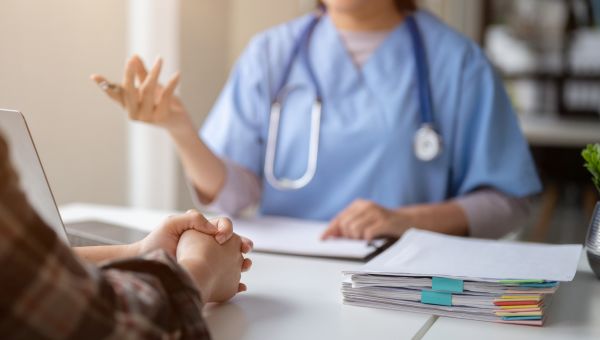6 ways to get the most out of an obgyn appointment
Here’s what gynecologists want their patients to know.
Updated on April 9, 2024

Whether you’re visiting an OBGYN for the first time or you’ve been going for decades, an annual wellness visit is a great opportunity to discuss health concerns and get information about screenings and treatments. Here are some tips for getting maximum value out of your next visit.

Find a Provider You Trust
Your relationship with your healthcare provider (HCP) should be a two-way street, so it is key to find one who makes you feel heard. “If you're not getting along with your [OBGYN], then fix your situation,” suggests Arjav Ted Shah, MD, of Orange Park Medical Center in Florida. “Find one who will pay attention to you and know you as a person as opposed to just a patient or diagnosis, so that you feel you are being treated well, being listened to, and directed.”
To find an OBGYN who’s right for you, ask friends and family for recommendations. If you have a primary HCP, they should also be able to refer you to someone. The American College of Obstetricians and Gynecologists has searchable directories to help you find a list of potential clinicians in your area, as well. You may want to meet with a few to find out who is the best fit for you.

Know Your Body And What’s Typical For You
It's important to be in tune with your body so you can recognize when something unusual happens, says Shah. “Know what your breasts feel like [and] your typical discharge and menstrual cycle pattern," he advises. "If you find any bumps or notice a change in discharge or irregular bleeding, bring it to a physician's attention."
As with any other HCP, it’s critical to be open and honest with an OBGYN about your concerns, symptoms, and medical history. For some people, talking about certain issues or their sexual past may feel uncomfortable. But this is vital health information that will help decide which screenings, safety measures, or treatments might be needed.

Arrive at Your Appointment Prepared
Write down your health concerns and questions before your appointment and bring the list with you, suggests Darcy Bryan, MD, of Riverside Community Hospital in California. "It's pretty surprising how the second you walk into the office your mind can go blank and you can forget all of your questions," she says. Topics to address can include new symptoms, menstrual issues, birth control, and screenings, among many others.
It’s also helpful to bring a list of medications, supplements, and vitamins you use. Knowing what you take can aid diagnoses and treatment decisions. It may also help prevent dangerous drug interactions if your OBGYN prescribes medication.
Try to wear comfortable, loose clothing to your visit, since you’ll have to change in and out of a medical gown. Bryan also recommends avoiding sex for 24 hours before your appointment in case you need a Pap test. Having sex just prior to a Pap smear may inflame your tissue and can affect your test results, she says.
Also avoid douching, or using any vaginal medicines or spermicidal foams, creams, or jellies for two days before having a Pap smear. These can wash away or obscure abnormal cells. And, consider scheduling your appointment for a week you don’t expect to have your menstrual period. It's best to avoid this time of your cycle, if possible.

Ask About Other Health Concerns
It's a good idea to have a primary HCP for comprehensive medical care. But keep in mind, gynecologists do more than Pap tests and breast exams, says Shah. When people come for their annual visits, gynecologists are able to evaluate them for other conditions and talk to them about preventive health care measures, he explains. Gynecologists can even order tests that you would usually expect to get from a family provider.

Avoid Trying to Self-Treat Symptoms First
If you have unusual symptoms, such as itching or foul-smelling vaginal discharge, don't try to treat them yourself with over-the-counter (OTC) medications. Doing so before you’ve been evaluated by an HCP could do more harm than good.
Why? You might accidentally treat yourself for the wrong condition. For example, bacterial vaginosis, which requires antibiotics, is often mistaken for a yeast infection. Taking the wrong OTC treatment would not cure your condition—and it could worsen your symptoms.
Instead, make an appointment to see an OBGYN so you can be properly diagnosed, says Bryan. When you call, be sure to mention you are having uncomfortable symptoms that need to be seen right away. This way, the office knows to fit you in as quickly as possible. If you can't get in right away, consider going to an urgent care clinic, where they can make an accurate diagnosis and recommend effective treatments.

Don't Go It Alone
It can be very helpful to have a trusted friend, family member, or partner come with you to the OBGYN, especially when you have to make an important health decision or get information on surgery.
"Having a second pair of eyes [and ears] that are sympathetic to you [helps], especially if you're under high levels of stress, where you can forget key pieces of information or instructions or questions to ask," Bryan says. If your advocate is open to it, ask them to take notes for you during the appointment.

The American College of Obstetricians and Gynecologists. Find an OBGYN. 2022
The American College of Obstetricians and Gynecologists. Your First Gynecologic Visit. June 2022. Accessed July 22, 2022.
Planned Parenthood. Can you get a pelvic exam when you have your period? June 29, 2020. Accessed July 22, 2022.
John Hopkins Medicine. Pap Test. 2022. Accessed August 24, 2023.
Rachel Urrutia. What’s the difference between a yeast infection and bacterial vaginosis? UNC Health. December 11, 2019.
Mayo Clinic. Pelvic exam. July 24, 2021. Accessed July 26, 2022.
American Cancer Society. The Pap (Papanicolaou) Test. January 3, 2020. Accessed July 26, 2022.
Centers for Disease Control and Prevention. What Should I Know About Screening? December 14, 2021. Accessed July 26, 2022.
More On


video

article

slideshow


video


video
